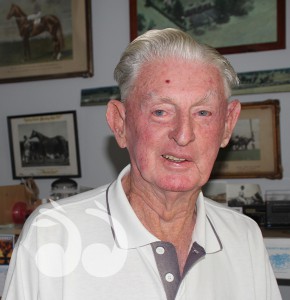Big Money
By Harley Walden

Harley Walden, racing coloumnist
Every jockey dreams of a Melbourne Cup carnival like it.
When Brett Prebble rode eight winners from 30 rides at the 1999 Carnival, he was in heaven.
In 1947, Jack Purtell had 20 rides, won eight including the Melbourne Cup on Hiraji, and finished second five times.
So consider the feat of Tom Hales – a kid who ran away from his home in Portland, NSW, to become a jockey: He rode 11 winners from only 14 rides during the three-day 1888 carnival.
Hales did not win the Cup that year, but his performance at the carnival underlined his dominance of the racing circuit at the time.
One of his wins was on Ensign in the Victoria Derby, a race in pipped the mighty Carbine in a controversial finish.
Hales carved out a phenomenal career in the saddle, winning all of Australia’s major events, including the 1880 Melbourne Cup on Grand Flaneur.
Although Hales had only one success in the Melbourne Cup, he also collected three Sydney Cups, eight Australian Cups, two Adelaide Cups, one Launceston, one Hobart, two Albury, six Geelong Cups and one Ballarat Cup.
He celebrated six AJC Derby’s, seven Victoria Derby’s, ten VRC St Legers, seven AJC St Legers, four South Australian St Legers and seven Champion Stakes, and his 21 St Leger successes gave him one victory for every year of his riding career.
Hales was dubbed the “Archer of the Antipodes”, named after England’s legendary Fred Archer.
He chased carnivals, venturing around the nation despite the difficulty of travel at the time, and stamped his authority at every port of call.
Unfortunately for Hales, his regular ride Grand Flaneur broke down hopelessly in the near foreleg while in training for the AJC Autumn Carnival.
Hales missed out on another Cup winner four years earlier when his regular mount, the great mare Briseis, carried only 40kg, which was far too light a weight for the champion hoop.
That opened the way for another intriguing part of racing history, Hales’ replacement was an apprentice jockey, a 13-year-old Aboriginal who rode under the name Peter St Albans.
His real name was Bowden, but he took his surname from the stables where Briseis was trained.
Hales instead rode the 13/4 favourite Fen d’Artifice, who was owned by Herbert Power, finishing 11th.
Briseis was a remarkable filly who won the Doncaster Handicap as a two-year-old.
Two days after her Melbourne Cup win she won the Oaks, meaning in the space of only six days she won the Derby, Cup and Oaks, a feat that has never been equalled.
Unfortunately, she did not win another race, and was retired to stud.
In her first season, 1879, she was sent to King of the Ring and while being hobbled, reared up, fell backwards, fracturing her skull.
Her death was a severe loss to Australian bloodstock, but she went down in history as one of the greatest mares ever produced in Australia.
Hales also finished second on The Ace in 1872 – beaten by The Quack, who gave his famous owner John Tait his fourth success in the big race.
Hales was described as “a great rider who not once in 50 rides makes the slightest error in judgement”.
He once told a Melbourne journalist: “In a big race, there is no time for deliberation. Everything has to be done in an instant, and if a good judge of pace is in the straight with half a dozen horses ahead of him, he can see at a glance whether they are likely to come back to him or whether he must go up to them.
“The sense of touch, more than anything else, will tell you when your horse begins to fail. You must judge others by sight.”
Hales was regularly part of massive plunges, one was when Robert Kelly Maitland supported Sirocco to take out Sydney’s classic Sapling Stakes (the forerunner of the Golden Slipper) at Randwick in the 1870s.
Hales had nerves of steel and rarely lost when the big money was on his mounts.
Hales had the rare privilege of beating the legendary Carbine when he won the 1888 Victoria Derby on Ensign.
A tremendous interest was taken in the Australian debut of the New Zealand champ Carbine, who arrived in Australia having won the five races he contested in New Zealand as a two-year-old.
Carbine did not arrive in Melbourne until 10 days before the Derby but started 7/4 favourite. He was ridden by New Zealand jockey Bob Derrett, and with 50 metres to go had the Derby in his grasp.
Derrett dropped his hands and was allowing Carbine to coast to the line when Hales, riding James White’s gelding, brought his mount home in a terrific run and snatched the race.
Hales owed much of his success to the patronage of White, for whom he rode 137 winners from 302 mounts.
Hales also rode Petrea and Progress in the 1880 and 1881 Sydney Cup victories, and Navigator, Phargo and Abercorn in the 1882, 1886 and 1887 AJC Sires’ Produce Stakes.
Not bad for a lad who ran away from home at the tender age of 12.
Hales scaled the heights in the tough caper of racing and retired in 1894 at the age of 47.
He died a wealthy man six years later.
 scone.com.au
scone.com.au